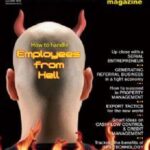Tracking the business benefits of GPS
GPS receivers can be found in mobile phones, dedicated vehicle units, and are behind many map-based online services. But where are GPS devices and services really heading, and what does it all mean for small business? By Vikki Bland.
|
My husband knows how to drive home; really, he does. But ever since we started trialling a GPS device from TomTom in our car he prefers to let the TomTom tell him how to do it. He says it’s great because instead of using his energy on realising where he is and where he’s going, he can think of ‘more important things.’ Having been married some time, I am wise enough not to ask what these more important things are. Instead, I suggest if enough people fall in love with GPS navigation, we will eventually all cease to practice the problem-solving skills associated with planning a route and become ‘dumbed-down’. My husband then gives me one of those looks people who have been married a long time are familiar with and I realise it’s a lost cause: my husband is sold on GPS. Apart from those who live life on the edge of spontaneity, most of us like to know where we’re going and dislike getting lost. What’s more, it’s kind of cool to have a voice in your car that knows exactly where your car is and will slavishly give you directions to your destination without once getting grumpy, impatient, incredulous or hysterical. No wonder then, that devices and services equipped with Global Positioning System (GPS) receivers are so popular with drivers, travellers, mariners and trampers. They can also be life saving if they are used in conjunction with search and rescue operations, and reduce stress for people like new immigrants who need to drive to a job interview two weeks after arriving in a country. GPS today GPS is a global navigation satellite system developed by the US Department of Defence and managed by the US Air Force. The only fully functional navigation satellite system in the world, it uses between 24 and 32 Medium Earth Orbit satellites that transmit precise radio wave signals to, among other things, allow GPS receivers to determine the current location, time, and speed of the vehicle, person or device they are connected to. But what can GPS do for a business? To date, commercial GPS devices and services have revolved around vehicle or craft location and safety and security tracking. A receiver is fitted to the vehicle or product, and then, depending on the GPS and system services purchased by the business owner, a number of things can be known. These include where it is, where it has been, the speed at which it is or was travelling at and, in the case of vehicles, the types of roads it has travelled on. Recently, vehicle-related GPS services and devices have become more sophisticated and able to relay quite specific information to drivers as well as business owners. This can include warnings about the speed the driver is travelling at relative to the standard of the road ahead, or the device may display an ideal route map for drivers that have to make multiple stops within a small area. Ian Daniel, vice president of Navman Wireless for the Asia Pacific and “We put market penetration in “GPS is an easy [return on investment] discussion,” says Daniel. He says these benefits include gathering benchmarking information including productivity gains and efficiencies; more accurate timesheets leading to more accurate wages; reports on fuel used in litres, total distances travelled, and the number of jobs completed by each employee. Local GPS solutions Navman Wireless devices and services are behind the vehicle location solutions offered by Telecom and Vodafone and their partners. In Telecom’s case, this service is called Locate+ and combines vehicle tracking, navigation and reporting. Victoria Crone, general manager business for Telecom says Telecom has sold 10,000 GPS units to customers using its Locate+ service, and confirms the service will be available on Telecom’s new mobile network (although new GPS units will be needed, and provided by Telecom.) Crone says location based services are the GPS applications presently most applicable to business, with the most common benefits reported as increased productivity and cost savings. Fleet management using GPS vehicle units and services is a competitive market, and a growth market. As a result, GPS service providers and communication providers are working hard to offer a complete solution that carries a unique proposition. For Government-owned communications company Kordia, that proposition now includes a mobile communications solution that builds the functionality of three separate devices – shortwave radio, cellular mobile radio and GPS – into one portable device, called a KorKor Digital Two Way Radio. Aaron Olphert, business manager for Kordia, says the benefits of combining GPS and normal radio communications services is that only one device then needs to be installed or carried and charges can be presented on one monthly bill. “The units are made by Motorola for field force work. A Web based-tracking system allows each business owner to track portable and vehicle units. All units have emergency buttons built onto them so that even if the unit is turned off the user can raise an alert in an emergency,” says Olphert. He says a mapping tool zooms in on the location where the emergency is occurring and shows the physical address. The cellular mobile service is privately managed by Kordia and specifically designed for business use. Manoj Dolli, CEO for Xlerate, says GPS devices and vehicle services save businesses significant costs through accurate assessment of road user charges (because the units can prove if a vehicle is on-road or off-road) and through automated workflow. “Many businesses need to make off-road claims for tax relief on road user charges. Xlerate puts that whole solution ‘in the cloud’, which means customers access their information through a web address. They don’t have to load maps, and we maintain all their location-based data securely,” says Dolli. He says off-road claim data is maintained for two years, along with other report options including those for carbon report and fleet use reports. “We have also integrated our system with the payroll system of some plumbing companies so they can pay their plumbers according to the information received from the units regarding the jobs they were on and their duration,” says Dolli. |
Xlerate has also provided a GPS package for the Taranaki District Council, with GPS readers integrated into waste bins, so the Council is able to see which bins are picked up where and when. Dolli says it’s important that GPS services deliver information in a useful way and in real time for business managers. “Any engineering student can buy a device, hook up to Google and get dots on maps – you need to present data in a meaningful form and in cohesion with the business. You need visible KPIs that deliver fleet use information and information on driver behaviour, such as harsh braking or accelerating. That’s far more business beneficial than just being able to look at trucks as dots on maps – which no one looks at anyway,” says Dolli. Luigi Cappel, sales and marketing manager for GeoSmart, says he is aware of a trial with buses in Cappel says the most important component for many fleet managers is accurate mapping to allow business owners to identify when vehicles are off-road so they can claim back road user taxes for vehicles that are off-road for any period of time. “Without an accurate map database you can’t prove if you are off-road or on-road. If you look at Google maps online, in rural areas a lot of the time the photography and the cartography isn’t quite right. For example, it can show roads drafted when New Zealand was first [regionally] planned, and while these were not built they still exist on paper and some show up on Google Maps. Some are also farm tracks. So if you were using those maps you’d think you were on a public road,” says Cappel. Russell Phillips, managing director for GPS Tracking NZ says his company has moved to providing products only associated with the GPS tracking industry. “This provides a one stop shop scenario for those companies wishing to combine vehicle security or other technology that combines with GPS tracking systems,” says Phillips. GPS Tracking NZ has introduced leasing options so businesses don’t tie up capital investing in GPS-based solutions. GPS tomorrow Phillips says in the near future, businesses will be able to control vehicles and products from a distance, such as using GPS services to tune an engine on an exotic sports car, or turn on or off a generator at a remote location. “We are also starting to see companies use GPS tracking for marketing. For example, if a company has their own website and they are trying to promote where their sales reps are or where their resources and vehicles are – such as a jet boat going through a canyon – they can use their own website.” Phillips says until the full value of GPS tracking becomes apparent, most companies will mainly only see the benefits of fleet tracking. “We are aware of companies in the Bruce Fowler, general manager online for Zeroin, says now more mobile phones are equipped with GPS receivers, Zeroin is offering a location service through Digital Mobile where vehicles and drivers can be tracked by mobile phone instead of an installed vehicle unit. The solution was commercialised by Zeroin following its initial development by Inter City Urgent Couriers. “Early last year Urgent Couriers were looking for a solution to locate their courier vehicles that were actually on the road. They didn’t want an in-vehicle solution because ten percent of their fleet is off the road at the workshop or at a panel beater at any given time,” says Fowler. He says the company developed a GPS application that runs on a mobile phone and tracks the handset rather than the vehicle. This means drivers can take their device to different vehicles, so the company knows which drivers and vehicles are on-road. Fowler says the system is affordable at around $15 per month per user and therefore suits businesses with simple tracking needs such as where people are and have been, giving location, speed, direction, and the amount of time stopped. Cappel says GeoSmart is looking to the future by deploying its ‘RapidCV’ vehicle, which is touring “We can start doing some amazing things for vehicle safety. For example, we can measure the camber of every corner and feed information about upcoming corners back to drivers. Fleet management systems also monitor the speed of the vehicle – so the system could inform the driver he or she is travelling too fast for a [specific] approaching corner.” In the future, business investing in GPS devices and services can expect to see them integrated with other GPS and online services provided by both the private and public sectors. One example of how this will be used is that GPS devices and systems will be able to tap into public information regarding obstacles such as road works or traffic light outages, and automatically re-route a business vehicle to avoid these hold ups. My husband can’t wait. Vikki Bland is an Auckland-based freelance writer. Email [email protected]
|






